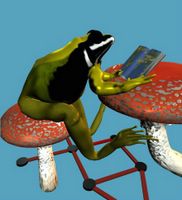At least that's what I think Mary Poppins would have said about Peeps. On its own it's a good, fun short YA novel. There's a little sexual tension, some violence, engaging characters, decent pacing and dialog and above all it doesn't talk down to its audience. Scott Westerfeld hammers out the same workmanlike prose that characterizes his other novels.
Where it really shines is the science. Science education in America is notoriously bad for the most part, and its treatment in popular culture usually isn't even that good. If it isn't cybermagic it's Cargo Cult Science or soft-pedaled because the witch burners are afraid that asking tough questions will make their Invisible Friend angry. You have to pan a lot of gravel to find the rare Bill Nye or Jared Diamond let alone Steven J. Gould (ztl) - (Unofficial SJG archive) We haven't yet gotten back to the bad old days of the Snopes trial. But we're pretty darned close when legislatures pass laws stating that students can not get marked down for any statement on an exam that stems from religious beliefs. Much as I want the whole world to be touched by His Noodly Appendage, Pastafarianism belongs in the kitchen and pirate ships, not the classroom.
That's why I'm so fond of Scott Westerfeld's YA novel Peeps and its sequel The Last Days.
Peeps starts off with a stock premise. There are vampires. Not many people know about them. Our hero is part of an old, secret government organization that captures and studies them. Then it takes a sharp turn to the educational. Vampirism is caused by a parasite which has profound effects on its host's behavior and biology. The even numbered chapters are entirely factual accounts of the strange and wonderful if disquieting world of parasite biology. The odd (sometimes exceedingly odd) chapters tell the story and use it to illustrate complex principles like optimum virulence, commensal ecological relationships, the profound effects of simple changes, parasite-host and predator-prey coevolution, and multiple-host lifecycles. It's entertaining. There's a lot of good information. It gets past cataloging facts and into the guiding principles. Great stuff even if you're old enough to have Young Adult Readers of your own.
The Last Days isn't quite as good, but it brings the more conceptual material in the first volume into focus. The mechanics of societal breakdown and of host-parasite coevolution get a more dramatic, personal treatment. It's definitely worth a read if you liked Peeps.
I don't think it will get the kids to switch from Nintendo to, well, this. But it's worth a try.
The book owes a lot to Parasite Rex, a debt which Westerfeld proudly acknowledges. If you can make it through Peeps without getting the creeping horrors you should check out Parasite Rex and some of Carl Zimmer's other excellent books on natural history. Just keep in mind that he's on the parasites' side, not ours. Waxing lyrical about the life of the bilharzia worm as a romantic love story and praising the ichneumonids speaks for itself. He claimed in an interview that he'd traveled all over doing the research and had never gotten the tiniest parasitic infestation even though other members in his party did. It's not an accident. The parasites know their own and extend their protection to fellow-travelers and quislings.
Saturday, March 01, 2008
Subscribe to:
Post Comments (Atom)




1 comment:
I <3 this book. I read it last year during the school year and just bought it over the summer, along with it's sequel Last Days. (Which wasn't as good.) He's incapable of writing a bad book!
Post a Comment